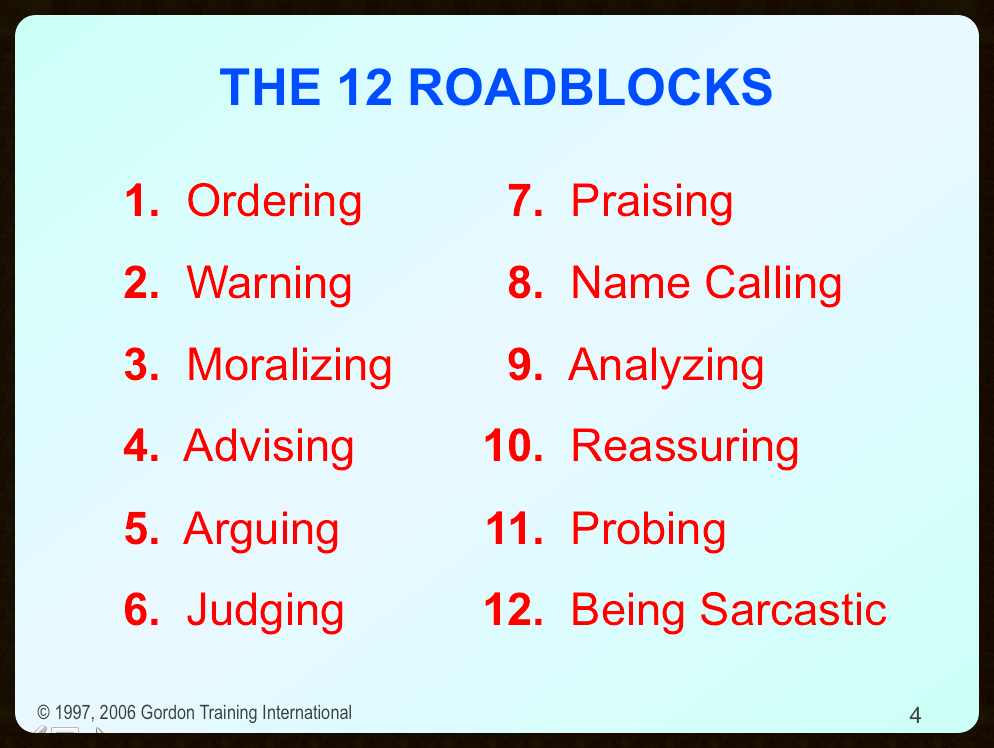How to Active Listen Silence
Parents often wonder how on earth to keep Active Listening when their child says nothing back!
This can happen, of course, with babies and pre-verbal toddlers. It's also not uncommon with boys who may naturally be more reticent. And any child of any age may be unwilling to talk.
But Active Listening is not just for verbal communication:
“To be effective in helping a particular child with his own unique needs and problems, a parent is obliged to acquire an understanding of that child. He does this chiefly through accurate listening to his child’s messages, nonverbal though they may be.”
The nonverbals can be her actions or more subtle body language, tone of voice, pace of speech and facial expressions. We use these to reflect back what we think she is feeling and the facts of the situation.
Let's look at what you might say in the following scenarios.
3 year old doesn't want playdate
One mother shared a time when her son woke up from his nap and refused to get ready for a playdate at his friend's house, saying "No go Ollie house!" She urged him, "Oh, but you have to. They're expecting us. Oliver really wants to play with you!"
The boy ran off and flung himself onto the couch.
At that point, the mother said, she realized she had used the Roadblocks of Ordering, Moralizing and Arguing. Now she wanted to Active Listen but what to do? He hadn't spoken!
We discussed ways to AL the wordless act of running away: "Thomas, you are so certain you do not want to go! You would much rather stay home and you're afraid that I might make you go!"
We imagined the divergent ways the conversation might develop if she continued to reflect back and let him explore what was bothering him. (Sometimes kids are not clear from the get go; I've experienced that as an adult!) Thomas might divulge something that happened at the last playdate or say he doesn't like the fact that Mommy is too distracted talking with others to pay attention to him.
If the parent can continue to AL whatever he says, or even his continued silence -- "You look very annoyed. It's no fun to be told you have to go somewhere when you don't want to." -- his negative emotions can be acknowledged and released. Again, Dr. Gordon shares on page 66:
". . . [P]eople free themselves of troublesome feelings when they are encouraged to express them openly. Active Listening fosters this kind of catharsis. It helps children to find out exactly what they are feeling. After they express their feelings, the feelings often seem to disappear almost like magic." [italics in original]
With the emotional release, the presenting problem may disappear; here, Thomas might say, "C'mon. Let's go!"
Or he may still not want to go. Yet, since his emotions have been attended to, he is more able to use the reasoning part of his brain and listen. So if, in fact, going to the playdate is important to you, at least now you have his ear and can use the insight you've gleaned as to your son's unmet needs.
You could then choose to do a Method III Problem-Solve and help the child make an informed decision, starting with something like:
"We have a problem. You are just not in the mood to go to Ollie's house. However, this is the only chance you have to play with him for a while since they are going on vacation soon. I know he will be disappointed. And I like seeing his mommy -- she's a good friend. Hmm, I wonder what we can do about this? You are tired and think the playdates are too long. How about if we stay only half the time?" (He's still young so you more readily offer up a solution.)
And here, though a bit off topic, I want to bring up the concern raised in class: If we let the boy stay home, hasn't the parent lost?
It's true, you may not get the compliance you want, if you feel that he MUST go to the playdate. (In P.E.T. we learn to focus less on getting our solutions -- going to the playdate -- and more on meeting our needs -- such as relaxation, belonging, acceptance and self-esteem. This way we can be more flexible and creative in meeting those needs while respecting the other person.)
Yet, the alternative to listening and being swayed by what you hear would be to force him to go. Using power to resolve conflict carries risks -- fight, flight or submit -- that grow more serious over time.
But the willingness to decipher his wordlessness and the help you give him in processing any and all emotions will lead to gratitude, closeness and a willingness to listen and cooperate to help you meet your needs too. You will be deepening a relationship based on empathy and mutuality.
These are things to keep in mind if you feel like he's pulled one over on you. Because you will have swapped power for something far more precious: influence.
6 year old mortified during a family game
We had houseguests last week and my good friend allowed me to share what happened with one of her three daughters.
The two families were playing a raucous game of Pictionary in the living room when Tara triumphantly returned to the sofa from her turn. When she flopped down, she fell on Claudia who yelped in pain. Tara was shocked and embarrassed; she must have slunk upstairs a few minutes later as the game was winding down.
Finally, it was time for Thanksgiving Day pie! When we realized our youngest friend was missing, her mother went to find her only to return alone. She reported that, indeed, Tara had been taken aback by Claudia's response and was still very much chagrined.
Claudia and I decided to try to help.
Tara's birdlike figure was facing the wall and curled up under the covers on Harrison's bed. Claudia approached first:
"Tara, I'm really sorry. I didn't mean to scare you or make you feel bad. You should come have some pie."
Silence.
Claudia looked at me. I hesitated, then began.
"It looks like you were really shocked when Claudia yelped with a loud voice because it was just an accident. You didn't mean to fall on her and it was embarrassing to have everyone looking at you!"
Silence.
Active Listening is reflecting back what you know of the situation and guessing the underlying feelings. I just kept imagining what the last 15 minutes or so had been like for her.
"It must have been really sad and lonely to come up here all by yourself and not even see the end of the game when we were all having just SO MUCH FUN. That's not at all what you wanted to happen."
Silence.
I went on guessing:
The pie was likely all the more beckoning because Claudia had helped make it!
"And it's really disappointing because you've been looking forward to the apple pie all day (she had mentioned it earlier!) and now it's ready, but you're still feeling really embarrassed and shy."
Silence, but also the merest hint of movement in the shoulders.
I took that as a shift in energy and moved in with the information she probably was dying to know.
"Tara, I want to let you know that no matter what, there will be pie for you. So you can decide to come down and eat it now, or you can have some in the morning (they were leaving right after breakfast) . . . . Do you know what you would like to do?"
She shook her head of brown curls.
"Hmmm, I wonder if you would like me to get Mommy and she can help you decide?"
"Ok" came the small but energetic answer from beneath the duvet.
I think my friend had an easy time after that -- her beautiful daughter came down with a smile and even had a second slice!
Hey, let's be real: Active Listening is hard and requires practice. We are, after all, learning what professional counselors do for their clients.
Over time, though, it will become more natural. Yet, even before you become a pro, you CAN help your child feel HEARD even when he hasn't SAID anything. So keep on guessing and feeling your way through what might feel like a painfully awkward one way conversation.
The benefits for the child and your relationship are worth it.
Credits: Empty speech bubble (https://andyswordsandpictures.files.wordpress.com/2013/05/awkward-silence.jpg)





